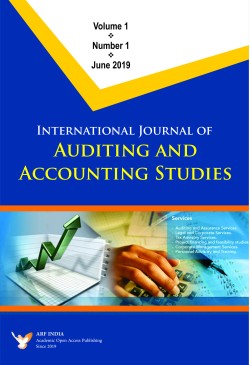
International Journal of Auditing and Accounting Studies
Frequency :Bi-Annual
ISSN :2582-3272
Peer Reviewed Journal
EDITORIAL NOTE
E-BANK AUDIT: An Empirical Study of Fintech Solutions in the Pre-and Post-COVID-19 Outbreak
Maysa Ali M. Abdallah, Tariq H. Ismail and Nayera Abdeldayem Eltamboly (2023). E-Bank Audit: An Empirical Study of Fintech Solutions in the Pre-and Post-COVID-19 Outbreak. International Journal of Auditing and Accounting Studies. 5 (1), 1-28. https://DOI: 10.47509/IJAAS.2023.v05i01.01
AUDIT DATA ANALYTICS: A Game Changer for Audit Firms
Siriyama Kanthi Herath & Prem Lal Joshi (2023). Audit Data Analytics: A Game Changer for Audit Firms. International Journal of Auditing and Accounting Studies. 5 (1), 29-48. https://DOI: 10.47509/IJAAS.2023.v05i01.02
THE ADOPTION OF BIG DATA ANALYTICS IN THE EXTERNAL AUDITING: Bibliometric and Content Analyses
Purpose – This study reviews the literature on adopting big data analytics (BDA) in external auditing. This goal is divided into several sub-goals. First, we aim to find the most productive and cited authors, documents, and sources concerning this research discipline. Second, we aim to organize and summarize prior literature to reveal the areas that have been studied and the gaps that require further investigation.
Design/methodology/approach – This study uses a systematic approach in reviewing literature. We utilized bibliometric and content analyses to provide a comprehensive and updated image of the current state of the literature and potential areas that need further research. Ninety-eight articles published between 2011 and 2021 extracted from 38 journals indexed in the Scopus database were included in our review.
Findings – The United States is the most productive country of research related to BDA in auditing, with 34 articles. The research trend flourished in 2015 to reach its peak in 2021 with 27 pieces. It is worth noting that the University of New Jersey (Rutgers University) is the most productive affiliation with 18 contributions. The most productive and cited journal was Accounting Horizons, with 16 articles. In addition, the most cited paper is “Big data in accounting: An overview” by Vasarhelyi, Kogan, and Tuttle (2015). Our analysis grouped the literature into three main research themes:1) BDA in auditing process; 2) BDA diffusion; and 3) BDA in auditing curricula. In addition, seven future research areas are developed: 1) research scope and methodology, 2) BDA and components of the audit process, 3) BDA and interactions with stakeholders, 4) new theories, 5) reasons for adopting BDA, 6) impact of BDA on audit firms, 7) BDA and auditing education.
Implications – This analysis provides valuable insights for audit academics, practitioners, and educators on using BDA in external auditing. The results of this study will inform academic researchers of potential future research opportunities. Moreover, this study presents the academic community’s insights that benefit audit practitioners and educators.
Originality/value – This study contributes to the literature by combining bibliometric and content analyses to provide a comprehensive and updated picture of the current state of BDA and the external auditing literature.
Keywords: Big Data, Big Data Analytics, Data Analytics, Audit Data Analytics, External Auditing, Audit Process, Audit Quality, Bibliometric Analysis, Content Analysis.
Ahmed S. Abdelwahed, Ahmad A. Abu-Musa, Hosam Moubarak & Hebatallah A. Badawy (2023). The Adoption of Big Data Analytics in the External Auditing: Bibliometric and Content Analyses. International Journal of Auditing and Accounting Studies. 5 (1), 49-85. https://DOI: 10.47509/IJAAS.2023.v05i01.03
THE IMPACT OF BLOCKCHAIN TECHNOLOGY ON AUDIT PROCESS QUALITY: An Empirical Study on the Banking Sector
Rehab Esam El Din Ragheb Hashem, Al-Rifai Ibrahim Mubarak and Ahmad Abd EI-Salam Abu-Musa (2023). The Impact of Blockchain Technology on Audit Process Quality: An Empirical Study on the Banking Sector. International Journal of Auditing and Accounting Studies. 5 (1), 87-118. https://DOI: 10.47509/IJAAS.2023.v05i01.04